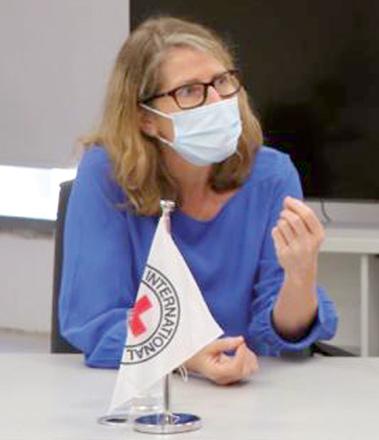- Local News
- Web-2021-08-11 | 02:41 pm

Nayrouz News Agency :
Sustainable human security and protection are among the International Committee of the Red Cross (ICRC)’s next radical courses of action to help bring stability to Yemen, according to the head of the ICRC delegation in Yemen, Katharina Ritz.
In an interview with The Jordan Times on Tuesday, Ritz said that ICRC’s work in Yemen is based on a systemic approach that focuses on priority areas; the ICRC provides direct assistance, supports the capacity of health systems and the physical rehabilitation sector, cooperates with authorities, fixes vital infrastructure, addresses malnutrition and implements programmes for women.
Ritz’ is currently on a visit to Jordan to meet with diplomats and other stakeholders to brief them about the humanitarian situation in Yemen.
Ritz said that the ICRC has different approaches to support the most affected people and "in this case are all Yemeni people”.
"Yemen has been hit by one crisis after the other,” she said, adding that the challenge for the ICRC is how to aid a population already impacted.
Throughout the six years of armed conflict in Yemen, there have been dialogues and successive efforts to stem the tide of the Yemeni conflict, Ritz said.
She added that "there is always hope. Hope is what makes us move forward and what drives us towards the end of a conflict”.
Ritz pointed out that ICRC’s mandate goes beyond assistance. The mandate also focuses on conflict-related detention, including releasing detainees, paying visits to prisoners, reconnecting families and ensuring the proper and dignified management of the dead in conflicts.
Ritz said that when the deceased are left in the battlefield for a long time, it is "extremely difficult on their families” and affects the identification process. She believes a proper management system for the deceased can help find solutions after a conflict.
"The humanitarian crisis in Yemen will continue as long as the ongoing conflict remains. The pandemic just came on top of all that,” Ritz said.
Amid the ongoing COVID-19 pandemic, many households have been hit, particularly in the north where the numbers of cases were not necessarily shared by the authorities, unlike in the south where COVID-19 figures have been shared, she said.
"The pandemic has for sure further exacerbated the difficult situation in Yemen,” Ritz said, adding that the ICRC works with the Yemen Red Crescent Society to support particular households.
The unprecedented health crisis did not stop ICRC’s operations in Yemen. The teams tried to stay outdoors and help Yemenis, as much as possible, she said.
In 2020, 5,811,970 individuals benefited from ICRC activities in the water and sanitation fields. Some 1,643,880 people, including those displaced, received various forms of assistance including food, cash grants, essential household items, agricultural and livestock assistance, Ritz said.
Moreover, 1,324,123 consultations were given to patients in 83 ICRC-supported health facilities. Almost 20,000 detainees benefited from improved living conditions, through access to clean water and new ventilation and sanitation systems inside detention places, she said
During the interview, Ritz gave a brief update on the situation in Yemen and the conflict’s toll on the normal growth and maintenance of life. "The situation is not just an embargo, a conflict, or a displacement. It is truly a crisis that keeps piling up,” she stated.
"Yemen is facing the world’s largest food security emergency, leaving nearly 20 million people — representing 66 per cent of the country’s population — in need of humanitarian assistance,” the ICRC website said.
The ICRC works to meet the basic needs of Yemenis and assist the health systems, on the verge of collapse, Ritz stated. She added that the ICRC is looking to expand its development projects and sustainable protection activities, going beyond household protection programmes.
"Yemeni people are strong, in particular women. They are engaged and hospitable. They are connected to their country, which is a true motivation to support them,” Ritz concluded.









